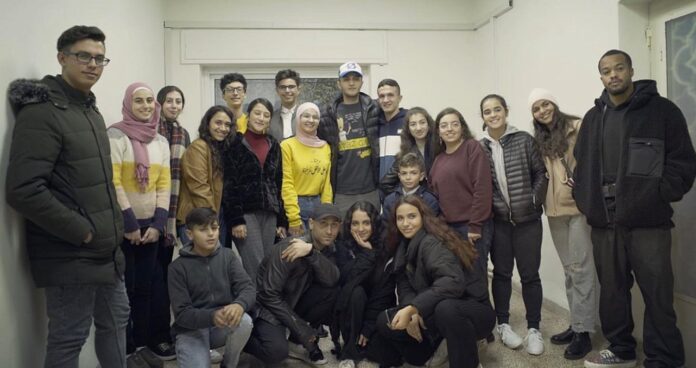LONDON: The documentary “Walled Off,” which premiered in Italy on Thursday, features a star-studded collaboration of active voices in the public eye speaking out about Palestine.
The film is written and directed by Vin Arfuso, an American filmmaker of Palestinian and Italian descent, and co-produced by American-Palestinian model and musician Anwar Hadid
Other producers on the project are Kweku Mandela, grandson of the former South African president and anti-apartheid campaigner Nelson Mandela, and Pink Floyd co founder Roger Waters.
The pre-release screening of “Walled Off” took place at San Carlo auditorium in Albenga, in northern Italy, as part of European artist-activist Cake$’s debut solo exhibition “A Child Is Born In Bethlehem.”
Taking its title from the Walled Off Hotel in Bethlehem, owned and designed by anonymous British artist Banksy, the film underlines the importance of socially and politically engaged art.
The documentary follows Hadid as he explores the hotel’s site-specific installations and storied halls with head manager Wissam Salsa.
Located next to Israel’s separation wall, which encloses occupied Palestine and annexes part of its land, Banksy said it has the “worst view of any hotel in the world.”
Therefore the title “Walled Off” is also a wordplay, underlining that, just as Palestinians are “walled in,” Palestine is “walled off” to the rest of the world. In this sense, the film lets viewers in to join Hadid and Arfuso on their journey.
Hadid and Arfuso have been friends since 2018, and first traveled to the West Bank together in April 2019, when Arfuso shot a music video for Hadid’s song “Progression 101.”
The two returned six months later and filmed “Walled Off ” over 10 days “guerrilla style” after Arfuso’s equipment was withheld on arrival in Israel.
Arfuso told Arab News that this meant that he had to film with an iPhone at times, or mix and match whatever camera and lens he had available.
However, the very rawness of Arfuso’s “imperfect” filmmaking style highlights the tragic beauty of Palestinian resilience, while avoiding any glamorization of the occupation.
As a manifestation of Arfuso and Hadid’s dedication to completing the documentary, the cinematic approach perfectly mirrors what is at the heart of the story — that visual activism matters.
Later scenes feature archival footage stretching back over five decades, which supports the story’s message on multiple levels.
“Walled Off” achieves its aim of challenging the Western media narrative regarding the Palestinian struggle with admirable frankness and surprising wit.
It also serves as a compelling look at injustice, chronicling the destruction of Palestinian lives, property, public life, and the daily struggle for human dignity in Palestine.
While grounding Arafat as a national identity symbol, the film tells the larger story of the Oslo Accords and the peace we almost achieved. While it is heartbreaking to see the possibility of a better future slip away, it also serves as a reminder that it is not impossible. In this way, the film encourages viewers to keep strategizing for change.
“Art should comfort the disturbed and disturb the comfortable,” Banksy says.
As a form of art itself, “Walled Off” has done exactly that.
Hadid and Arfuso both make appearances, but this does not detract from the film’s message.
“It was very important for me and Anwar not to make it about us. We don’t want the selling point to be us; we want the selling point to be, if there is one, the children of Palestine, and what’s important and what’s happening on the ground,” Arfuso said.
“We faced a backlash, but the best thing about it is that we welcome it; we are only calling for human rights. If there’s a backlash for calling for human rights, clearly there’s something wrong in that situation and, hopefully, that will get people to look deeper into it.”
“Walled Off” will be released in early October.

